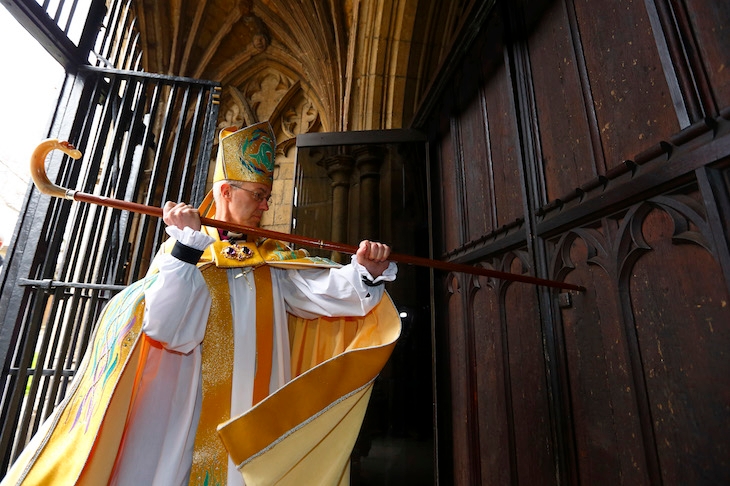‘Dignity lost half its value yesterday’ began a news story in Saturday’s Daily Telegraph. As I read on, it turned out that Dignity is a large firm of undertakers, but I had momentarily taken these opening words as a general statement about our times. As such, they seem well supported by the facts.
As I walked across Horse Guards one day last week, everything seemed eerily quiet. No one was about, and the only object I could see was a sleek limousine parked where one is not allowed to park, facing Downing Street. As I approached, I could read its number-plate, which said ‘1 VEN’. Was this the beginning of the long-awaited Corbyn coup, backed by fraternal aid from Nicolás Maduro? I cannot yet answer my own question for certain, because although Theresa May is still referred to as the ‘Prime Minister’ and even holds ‘cabinet meetings’, no one seriously suggests that she — or they — transact the business of government. Supporters of Boris Johnson announce what he will say at these meetings (‘£100 million extra a week for the Health Service, please’). Supporters of Philip Hammond (a select group) announce that he told Boris that he (Boris) is not allowed to say that sort of thing because he is only Foreign Secretary and Mr Hammond is Chancellor of the Exchequer. This power vacuum ought to be exciting. Strangely, though, it is not. Nicholas Boles, quoting Orwell, speaks of a government of ‘boiled rabbits’. Sir Nicholas Soames, who has embarked on a brilliant second career as an upper-class Tweet, calls it ‘dulldulldull’. At least the phenomenon is not new. ‘Lost was the Nation’s sense, nor could be found,’ lamented Pope nearly 300 years ago. His ‘Dunciad’ is an entire poem about the reign of the goddess Dulness: ‘ The Vapour mild o’er each Committee crept/ Unfinished Treaties in each Office slept;/ And Chiefless Armies doz’d out the Campaign;/ And Navies yawned for Orders on the Main.’ The funny thing is that it suits the chief players for the goddess to retain her throne for the time being, at least until the date of Brexit. The even funnier thing is that they might be right to keep her in place. What’s the alternative? (In fairness to politicians, I ought to point out that the ‘Dunciad’ is actually about journalists. As such, it remains highly apposite as we in the mainstream media wrestle with the effects of technological change.)
It is quite unnecessary and truly sad that the Archbishop of Canterbury has painted himself into a corner over the case of George Bell, the heroic, long-dead Bishop of Chichester. Last week, several historians who have studied Bell wrote to him to say that the Carlile report (which the Archbishop had himself commissioned) had clearly shown that the church’s procedures in finding that Bell had abused a girl in the late 1940s were shockingly deficient. Archbishop Welby replied to them this week, emotionally, but without answering their point. He compared the case of Bell with that of Peter Ball, the former Bishop of Gloucester, who had many powerful defenders who thought they knew him well, but was rightly convicted of abusing young men and sent to prison. There is no similarity, because the evidence against Ball was huge, and that against Bell is negligible. The Archbishop says how important it is to take accusations of child abuse seriously. It certainly is, but the key question (which he evades by saying only that the church ‘acknowledges’ the accusation against Bell) is whether the accusation is true. Does he believe that it is? If he does, he must say why. He has to use the methods of justice. The Carlile report shows that even the civil law’s threshold of belief — the balance of probabilities — is not reached in this case. The Archbishop reveals his anxieties by referring in his letter to the church’s forthcoming appearance before the Independent Inquiry into Child Sexual Abuse, where he fears accusations of ‘cover-up’. By condemning a man without proper evidence, he is not showing the ‘transparency’ which he says the church seeks. He is covering up the scale of the church’s mistake.
John Barton, who has just died, was a brilliant interpreter of Shakespeare. He propagated his idea of how the plays should be spoken in the early, glorious years of the RSC. It dominated my generation, and probably still dominates the rising one. The idea was to be more ‘natural’ and accord less reverence to the verse. It worked, but in a way it was just as ‘mannered’ as the Victorian/Edwardian approach which it displaced. Modernising innovations, though often necessary improvements, inevitably become dated themselves, like once-groovy haircuts. It would be fascinating if a modern director were to try seriously to realise a new production in the manner of someone like Henry Irving or Beerbohm Tree. The interpretation of Shakespeare does not progressively improve over time in the way that, say, brain surgery does. It reflects the strengths and weaknesses of the age in which it appears.
Learned readers have answered, or at least elucidated, my question (Notes, 20 January) about whether one can be ‘sat’ (or ‘stood’). The first entry comes from Martin Taylor, the distinguished member of the Financial Policy Committee of the Bank of England (but not writing in that capacity). He suggests that the usage comes from his native north of England (‘I were sat’ meaning ‘I was sitting’). He points out that it parallels the now archaic ‘He is gone’, which he thinks derived from Norman French and Middle English grammar, in which the verb ‘to be’ is used to form the perfect tense of intransitive verbs. He wants to know why it was that English ‘migrated to “have” to form the present perfect for all verbs’. He also identifies a new usage. When he goes to a GP appointment, and enters his name on the surgery’s tablet, it says, ‘Mr Taylor, you have been arrived’.







Comments